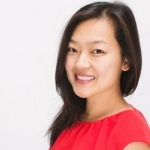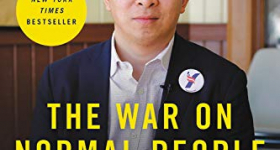In the post-9/11 world, the war on terror has dominated the political landscape of the United States. The ongoing wars in Afghanistan and Iraq-and the possible invasion of Iran-are key events of early 21st century history, and Asian Americans have played profound roles.
Some have helped shape Bush administration policies. Some have been catalysts for the anti-war effort. Others have been targets of xenophobia and racial attacks.
Army Lt. Ehren Watada was the first military officer to refuse deployment to Iraq in 2006 and called the war illegal. Stephen Funk enlisted in the Marines in the months after 9/11 and became the Iraq war's first public conscientious objector-someone who is in the military but refuses to participate in a war on moral grounds. South Asians, often mistaken for being Middle Eastern, are common victims of racial violence tied to 9/11 and to government racial profiling. Immigrant communities continue to be targeted under the guise of national security. And across the country, numerous Asian American anti-war organizations have sprouted.
Watada faced a court-martial for standing up for his beliefs, but his case was thrown out in a military court. The Army refuses to discharge him; meanwhile, he's been given a desk job.
"The military is of course playing their own game, trying to harass people as much as possible," Watada's father, Bob, said in a phone interview from Oregon (he said his son has not fielded media interviews per his lawyers' advice).
Over the last few years, Bob Watada toured 40 cities in dozens of states to talk about his son's case. He's spoken at major anti-war rallies and admits that if it were not for his son's actions, he would not have become an activist.
Other Asian Americans have engaged in the debate over the war including: D.C. Asians for Peace & Justice in Washington, D.C., Desis Rising Up and Moving (DRUM) in New York, Asian and Pacific Islander Coalition Against War in the San Francisco/Bay Area, and the national alliance BAYAN-USA, among others-though there have been few acknowledgments of such groups in mainstream media.
Funk, now 26, was 19 when he joined the Marines. He signed up because he felt that the military would lead him to be able to do some good.
But entering the ranks of the military forced him to endure endless harassment and face racism and homophobia. He recalls that in basic training, he and another Asian American were given duties as "linen recruits"-basically doing everyone else's laundry, folding clothes and making beds.
"The first day they were assigning the jobs, they said, 'Where are the Chinese recruits?' " says Funk, who is Chinese, Filipino, American Indian and Irish. "Everybody's differences are exploited and made fun of."
Funk said that being Asian-and also gay-had a lot to do with him filing for conscientious objector status. He questioned the military's goal of conformity and of training to kill, and began equating the violent culture pervasive in the military to the violence against him as an individual.
Funk, who now lives in San Francisco, is regarded as the first conscientious objector to speak out against the war, though the military has denied him of conscientious objector status.
Whole communities have also been changed by 9/11, in particular, South Asians, who were targeted by hate crimes and by the government.
"I believe that South Asian communities, among Asian Americans, are the ones that have been hit most hard by September 11, and what happened after that. They're the ones who have faced the brunt of hate crimes," said Sangay Mishra, a doctoral student at the University of Southern California who is writing about the political incorporation of South Asians.
There were 507 hate crimes reported against Asians and Pacific Islanders in 2001-an almost 23 percent increase from 2000-many of them targeting South Asians, according to an audit by the National Asian Pacific American Legal Consortium, now known as the Asian American Justice Center.
Immediately following 9/11, South Asians from all religious backgrounds, such as Sikhs, Muslims and Hindus were targeted-but the most impacted South Asian communities are Sikhs and Muslims, according to Mishra. Balbir Singh Sodhi, a Sikh who wore a turban, was killed in Mesa, AZ, a few days after 9/11, the first in a series of racial attacks across the country. Sodhi's killer, Frank Roque, whose death sentence was commuted to life in prison, shouted, "I am a patriot!" while being arrested.
After 9/11, the government created a special registration list that required those from certain countries to report to their consulate, and those who did not have their visas in order were given deportation orders. Though there is an unknown number of people who were deported through special registration, an estimated 85,000 registered.
In Lodi, CA and Brooklyn, NY, Pakistani American communities were also interrogated and raided, resulting in deportations over alleged links to al-Qaida training camps. Personal bank accounts were watched, and if they worked for the government, their security clearance would be denied.
For many in the South Asian community, the post-9/11 reality was a wake-up call.
"There was this thinking in the community that they are welcome in the US, that they don't face any racial discrimination," Mishra said, adding that many South Asians held the model minority mindset. "September 11 has changed the perception of how South Asians feel about the US and how they feel about their location in the US. For the first time, South Asians felt that we are not seen as insiders, and realized how tenuous [our] relationship with the US was."
Organizations like South Asian Americans Leading Together in Maryland have been active in giving South Asians a voice in the political process-but this awakening since 9/11 hasn't led to mass political mobilization, Mishra said.
Some who have witnessed members of their communities impacted by post-9/11 policy have formed their own groups, such as attorney Banafsheh Akhlaghi, who founded the San Francisco-based National Legal Sanctuary for Community Advancement in 2004, and started taking on cases pro bono or for a scaled down fee following 9/11.
Her nonprofit has 30 active cases and has helped over 2,700 people by providing legal advice or referring them to other resources. cases from those of Iranian descent are increasing.
About 64 percent of the clients last year were of Iranian descent, about 9 percent from Pakistan, and the rest a mix, including 5 percent who are US-born citizens.
Akhlaghi has seen how people have reacted, and it looks familiar.
"It's very similar to the Japanese American experience during World War II," Akhlaghi said. "There are those who try to show themselves as very American and patriotic, whatever that means. Saying, 'No one is treating us poorly.' Then there are those who are angry and getting very, very bitter.
"Then there are those who are saying, let's just keep our head down. If there's abuse, if someone leaves a death threat at our doorstep, we won't tell anyone about it. We'll just turn the other cheek. The majority of the people are in the turn-the-other-cheek category."
A positive result of the atmosphere since 9/11 is that many young Asian American and Middle Eastern students are going into civil rights law, doing "post-9/11" work or going into media and organizing work, Akhlaghi said.
Another aspect of post-9/11 life is that immigrants have become suspect, and immigration has become a national security issue. The atmosphere of fear and hatred of the "other" has made it easier for certain Bush administration policies to take root.
In 2003, the United States began deporting Cambodian refugees, many men in their 20s and 30s who got caught up in gang activity and who never became US citizens. Recently, the United States signed a similar repatriation agreement with Vietnam.
"After 9/11, the Bush administration put pressure on Cambodia to accept the former refugees," said Many Uch of Seattle, who is awaiting deportation. His story, along with several other Cambodians, is part of the documentary Sentenced Home.
Uch, who came here as a refugee in 1984, was an accomplice to a robbery when he was 18. He was convicted and served 40 months in prison. After his release in 1997, he went straight to an immigration detention until 1999.
About 175 of the 2,000 Cambodians who are awaiting deportation have been sent to Cambodia. Most are like Uch, living life in limbo.
"You have this hanging over your head all the time," Uch said. "There's basically nothing you can do. You try to live your own life, you try to make plans. Do you make plans to be deported or make plans to stay here? There's no answer to it, there's no relief."
Uch would like to stay here, where he's put down roots. He lives with his wife and young daughter, and works as a delivery driver for a nursery. He often volunteers after work mentoring young Cambodian Americans to become leaders in their community and to help them stay out of trouble.
But he doesn't know too much about his own fate. Cambodia has recently been accepting about 12 deportees a year, he said.
"The good thing is, if you do OK, if you keep yourself out of trouble, you might not be deported. You might be the last person on the list. It might be 10 years [until you're deported]," Uch said. "But then again, you don't know."
Momo Chang is a writer and proud mama based in Oakland, CA. She is also an editor for Hyphen.










Comments